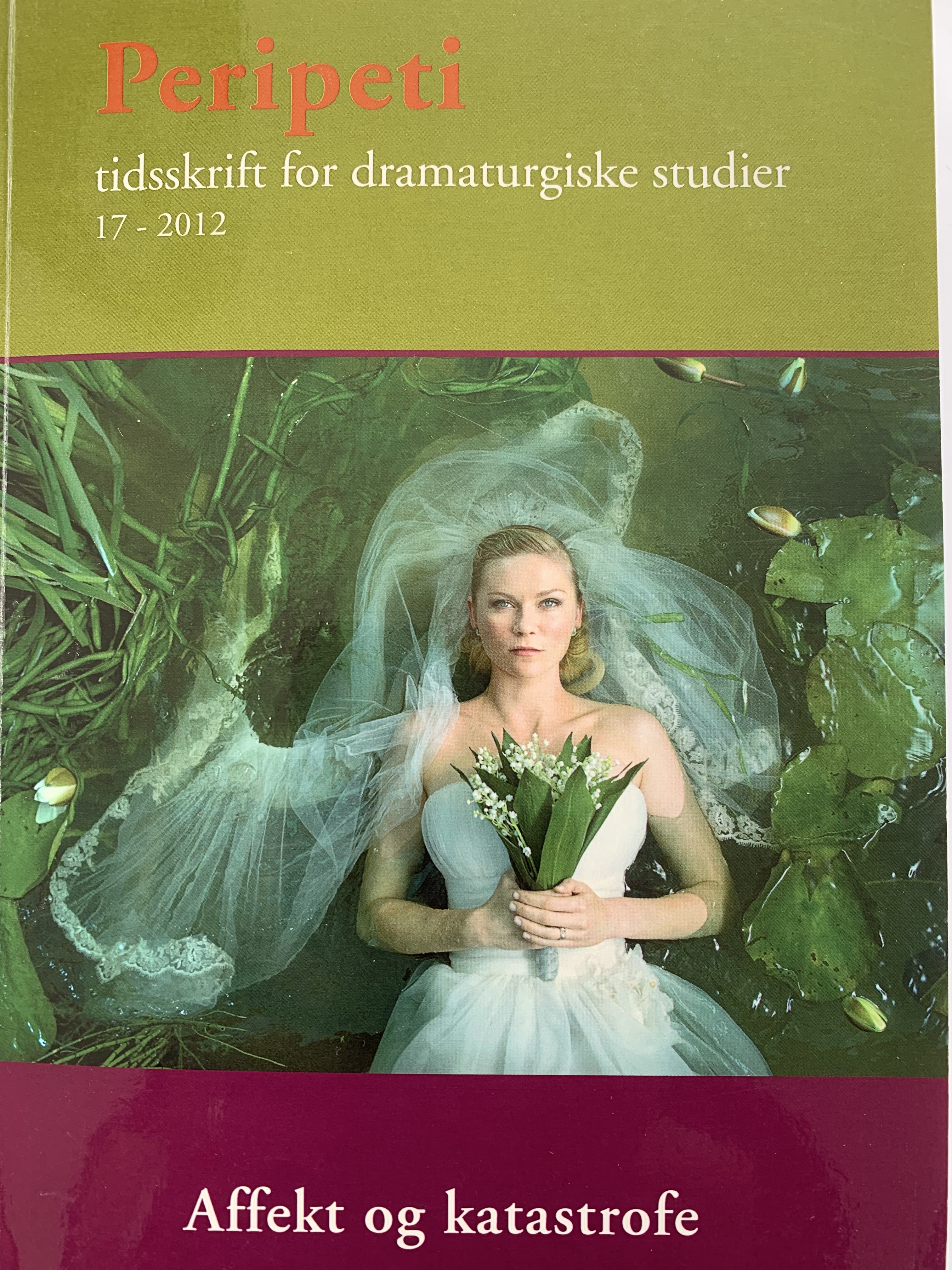Barrie Kosky’s The Lost Echo: rethinking tragic catharsis through affective emergenc(e)y
DOI:
https://doi.org/10.7146/peri.v9i17.108241Nøgleord:
Barrie Kosky, The Lost Echo, catharsis, affective emergence, aristotelian tragedy, abjection, affective excessResumé
Taking as her point of departure Barrie Kosky's 'post tragedy' "The Lost Echo" and referring to the concept of 'affective emergenc(e)y' Charlotte Farrell argues for a rethinking of the Aristotelian concept of tragic catharsis and the distinction between audience and performance, subject and object traditionally associated with this concept.
Referencer
Artaud, Antonin. (1988). Antonin Artaud: Selected Writings, Ed. Susan Sontag. Berkeley and Los Angeles, University of California Press.
Barnhart, Robert. (1988). The Barnhart Dictionary of Etymology. New York, The H. W. Wilson Company.
Benjamin, Walter. (1998). Understanding Brecht. Trans. Anna Bostock. London and New York, Verso.
Brennan, Teresa. (2004). The Transmission of Affect. Ithaca and London, Conrell University Press.
Deleuze, Gilles. (2004). Difference and Repetition. Trans. Paul Patton. London and New York, Continuum.Deleuze, Gilles and Felix Guattari. (1987). A Thousand Plateaus: Capitalism and Schizophrenia. Trans. Brian Massumi. Minneapolis, London, University of Minnesota Press.
Fensham, Rachel. (2009). To Watch Theatre: Essays on Genre and Corporeality. Brussels, Belgium, Peter Lang.
Fitzgerald, F. Scott. (1995). Tender is the Night. London, Wordsworth Editions
Gibbs, Anna. (2001). ‘Contagious Feelings: Pauline Hanson and the Epidemology of Affect.’ Australian
Humanities Review. http://www.australianhumanitiesreview.org/archive/Issue-December-2001/gibbs.html, Issue 24, December.
Jay, Martin. (1993). Downcast Eyes: The Denigration of Vision in Twentieth Century French Thought. Los Angeles and London, University of California Press.
Kennedy, Barbara. (2009). ‘… of butterflies, bodies and biograms… Affective Spaces in Performativities in the Performance of Madama Butterfly.’ Deleuze and Performance. Ed. Laura Cull. Edinburgh, E.U.P., pp. 183-200.
Lear, Jonathan. (1988). ”Katharsis.” Phronesis 33 (3): 297-326.
Lehmann, Hans-Thies. (2006). Postdramatic Theatre. Trans. Karen Jürs-Munby. New York and Oxon, Routledge.
McCallum, John. (2009). Belonging: Australian playwriting in the 20th century. Sydney, Currency Press.
McCallum, John. (2010). “Putting it Back Together and Getting it on the Road: Australian Theatre in the 21st Century.” Philip Parson’s Memorial Lecture. November 28. http://www.belvoir.com.au/belvoir-news/philip-parsons-memorial-lecture-2010
Manning, Erin. (2007). Politics of Touch: Sense, Movement, Sovereignty. Minneapolis, University of Minnesota Press.
Manning, Erin. (2009). Relationscapes: Movement, Art, Philosophy. Massachusetts, The MIT Press.
Manning, Erin. (2009). ”What if it Didn’t All Begin and End with Containment? Toward a Leaky Sense of Self.” Body and Society 15 (3): 33-45.
Manning, Erin. (n.d.) Always More than One. (unpublished manuscript - forthcoming).
Massumi, Brian. (2002). Parables for the Virtual: Movement, Affect, Sensation. Durham & London, Duke University Press.
Massumi, Brian, ed. (2002). A Shock to Thought: Expression after Deleuze and Guattari. London and New York, Routledge.
Meyerhold, Vsevolod (1969). Meyerhold on Theatre, Trans. and ed. Edward Braun, New York, Hill and Wang.
Novero, Cecilia. (2007) “Painful Painting and Brutal Ecstasy: The Material Actions of Günter Brus and Otto Muehl” Seminar: A Journal of Germanic Studies, 43 (4): 453-468.
Ngai, Sianne. (2005). Ugly Feelings. Cambridge and London, Harvard University Press.
Sedgewick, Eve. (2003). Touching Feeling: Affect, Pedagogy, Performativity. Durham and London, Duke University Press.
Tanner, M. (2011). Heaven and Hell. The Spectator. London, p. 58.
Trezise, Bryoni. (2009). ”Ambivalent Bereavements: Embodying Loss in the Twenty-First Century.” Performance Paradigm 5 (2): 1-9.
Thrift, Nigel. (2008). Non Representational Theory: Space, Politics, Affect. Oxon and New York, Routledge.Wade, John. (2010) ‘Word Etymology: Astonish’ Read 5190-2010 http://read5190-2010.blogspot.ca/ (February 15)
Whitehead, A. N. (1961). Alfred North Whitehead: His Reflections on Man and Nature. New York, Harper and Brothers Publishers.
Downloads
Publiceret
Citation/Eksport
Nummer
Sektion
Licens
Det følgende vedrører alle Peripeti-udgivelser fra 2024, nr. 39, og senere:
Peripeti er et Diamond Open Access-tidsskrift, der giver direkte open acces til publiceret indhold ud fra princippet om, at det at gøre forskning frit tilgængelig for offentligheden understøtter en større global udveksling af viden.
Forfattere skal ikke betale for indsendelse, redigering eller offentliggørelse af artikler.
Forfattere, der bidrager til Peripeti, bevarer ophavsretten til deres artikler.
Forfattere accepterer at udgive artikler under en Creative Commons CC-BY-NC 4.0-licens. Vilkårene for denne licens tillader brugere frit at kopiere og videredistribuere materialet i ethvert medie eller format og at tilpasse, transformere og bygge videre på materialet, så længe der gives passende kreditering, et link til licensen gives, og eventuelle ændringer angives. Brugere må ikke dele eller tilpasse materialet til kommercielle formål uden samtykke fra licensgiveren. Brugen af licensen må ikke på nogen måde antyde, at licensgiveren støtter tredjeparten eller dennes brug. Licensen kan ikke tilbagekaldes.
Forfattere opfordres til at lægge deres artikler ud på personlige og/eller institutionelle hjemmesider for at sikre endnu større offentlig adgang efter udgivelsen. Forfattere har ret til at arkivere deres artikler i fondes og offentlige institutioners arkiver, men Peripeti anmoder om, at forfattere bruger et direkte link til den publicerede artikel på tidsskriftets hjemmeside, når det er muligt, da Peripeti som en ikke-kommerciel, offentligt finansieret udgiver er afhængig af niveauet af brugeraktivitet på tidsskriftets hjemmeside.
Vedrørende tidligere udgivelser, indtil 2024, herunder nr. 38:
Ophavsretten deles mellem Peripeti og forfatteren/forfatterne. Tidsskriftet er et open access-tidsskrift, der giver direkte adgang til alt indhold baseret på princippet om, at det at gøre forskning frit tilgængelig for offentligheden understøtter en større global udveksling af viden. Brugere kan frit kopiere og dele materiale i ethvert medie eller format, så længe der gives passende kreditering. Enhver anden brug kræver skriftligt samtykke fra indehaverne af ophavsretten.





